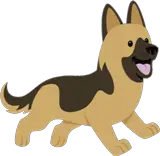Introduction
If you’re drawn to the elegance and grace of small breed dogs, then the Japanese Chin might have caught your eye. Known for their expressive faces and luxurious silky coats, these dogs are the epitome of charm and regal demeanor, originating from Asia with a rich history intertwined with royalty.
| Attribute | Details |
|---|---|
| Breed Group | Toy Group |
| Height | 20-27 cm (8-11 inches) |
| Weight | 3-7 kg (7-15 lbs) |
| Lifespan | 10-12 years |
| Temperament | Intelligent, Friendly, Good-natured |
| Exercise Needs | Moderate |
| Diet | Balanced commercial dog food, supplemented with certain fruits, vegetables, and lean meats |
| Common Health Issues | Heart conditions, Eye problems, Orthopedic issues |
| Trainability | Moderate to high with consistent, positive reinforcement |
| Grooming | Regular brushing and occasional baths needed |
Understanding the Japanese Chin
Temperament
Japanese Chins are known for their friendly and good-natured disposition. They are often described as being intelligent, curious, and full of life, which makes them wonderful companions.
Communication Styles
The Japanese Chin communicates in many ways. They use a combination of vocalizations, such as barking and whining, and body language to express their feelings and desires.
Intelligence and Trainability
These dogs are highly intelligent, but their independent nature can sometimes make training a challenge. Nevertheless, with consistent, positive reinforcement techniques, they are capable of learning a wide array of commands and tricks.
Physical Characteristics of the Japanese Chin
General Appearance
The Japanese Chin stands about 20-27 cm tall at the shoulder and weighs between 3-7 kg. Their most striking features are their large, round eyes and broad, flat faces. Their bodies are compact, with a plush coat that comes in a variety of colors and patterns.
Size and Weight
Japanese Chins are small dogs, typically weighing between 3-7 kg. Their small size makes them excellent companions for those living in apartments or houses with limited space.
Coat and Colors
The coat of a Japanese Chin is long and silky and can come in a range of colors including black and white, red and white, or black and tan.
Health and Lifespan of the Japanese Chin
Common Health Issues
Like any breed, Japanese Chins are prone to specific health issues. These may include heart conditions, eye problems, and certain orthopedic issues. Regular check-ups with a vet can help catch and address these issues early.
Lifespan and Aging
The average lifespan of a Japanese Chin is between 10-12 years. Proper care and regular vet check-ups can significantly contribute to the quality and length of their life.
Nutrition and Diet for the Japanese Chin
Dietary Requirements
Japanese Chins require a balanced diet that fulfills their nutritional needs. High-quality commercial dog food, supplemented with certain fruits, vegetables, and lean meats, can provide this balance.
Common Food Allergies
Some Japanese Chins may develop food allergies or sensitivities. If your Chin is showing signs of digestive upset, skin issues, or other unusual symptoms, it’s important to consult with a vet.
Exercise and Training the Japanese Chin
Exercise Needs
While they are not overly energetic dogs, Japanese Chins do need regular exercise to keep them healthy and happy. Daily walks, play sessions, and mentally stimulating games can help meet their exercise needs.
Training Techniques
Training a Japanese Chin should be fun and rewarding. As they respond best to positive reinforcement techniques, it is important to be patient and consistent during training sessions.
Grooming the Japanese Chin
Grooming Needs
Regular grooming is necessary to keep a Japanese Chin’s coat looking its best. This includes regular brushing to prevent matting and occasional baths.
Bathing and Coat Maintenance
Bathing your Chin too frequently can strip the natural oils from the skin and cause dryness. Therefore, it is generally recommended to bathe them only when necessary.
Living with a Japanese Chin
Compatibility with Children and Other Pets
Japanese Chins are generally good with children and other pets, especially when socialized from an early age. However, due to their small size, interactions should always be supervised to prevent injury.
Housing Needs
While Japanese Chins can adapt to various living situations, they are indoor dogs and should live inside with their family. They are well-suited to apartment living due to their small size and quiet nature.
Japanese Chin and Show Competitions
Breed Standards
If you’re interested in showing your Japanese Chin, it’s important to familiarize yourself with the breed standards set out by kennel clubs like the American Kennel Club (AKC).
Notable Japanese Chin in Competitions
There have been several notable Japanese Chins in the show ring. Examples include ‘Ch. Kelaury Good Luck From We-Syng,’ who won multiple Best in Show awards.
Adoption and Buying Considerations for Japanese Chin
Where to Find a Japanese Chin
Whether you choose to adopt or buy, it’s essential to do thorough research. For adoption, look for local breed-specific rescues or shelters. If buying, ensure you choose a reputable breeder.
Cost Considerations
The cost of a Japanese Chin can vary significantly depending on whether you choose to adopt or buy. Considerations include the initial cost, ongoing care, feeding, and potential health care expenses.
Traveling with a Japanese Chin
Travel Considerations
Japanese Chins, due to their small size and generally calm disposition, make excellent travel companions. They are usually adaptable and can handle changes in their environment well. When traveling, be it by car or airplane, it’s important to keep them safe and comfortable. A sturdy travel carrier that’s well-ventilated and secure is a must.
Helping Your Japanese Chin Adapt to New Environments
Despite their adaptable nature, any new environment can be potentially stressful for a Japanese Chin. If you’re on a trip, bring along familiar items such as their favorite toys, blanket, or bed to provide comfort. Also, try to stick to their regular feeding and walking schedule as much as possible to help them adjust.
Japanese Chin and Canine Sports
Canine Sports Suitable for Japanese Chins
While they might not be the typical choice for canine sports due to their small size, Japanese Chins can indeed participate in and enjoy certain sports. Obedience trials can be a great choice, as these competitions focus more on precision and the working relationship between the handler and the dog. Agility can also be a fun sport for these agile little dogs, but the jumps and obstacles should be appropriately sized for their small stature.
Training Your Japanese Chin for Canine Sports
Training for any dog sport should be fun and conducted in a positive manner. Japanese Chins, with their eager-to-please nature and intelligence, can excel in dog sports when trained patiently. Remember, the goal is not just to win, but to enhance your bond with your dog and keep them physically and mentally stimulated.
Conclusion
Throughout this guide, we’ve delved into the various aspects of the Japanese Chin breed, from their unique characteristics and needs to their health considerations and living situation. Owning a Japanese Chin can be a rewarding experience, filled with love and companionship. Understanding and catering to their specific needs will ensure a happy and healthy life for these adorable creatures.



